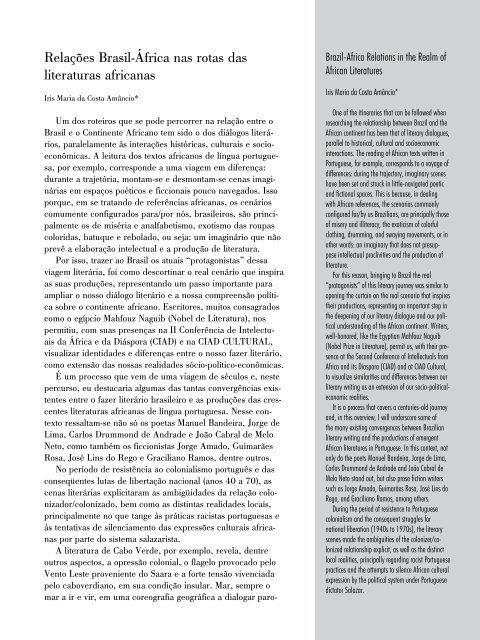Africa and Diaspora Post - CIAD II Edição/Edition - Ambiente ...
Africa and Diaspora Post - CIAD II Edição/Edition - Ambiente ...
Africa and Diaspora Post - CIAD II Edição/Edition - Ambiente ...
You also want an ePaper? Increase the reach of your titles
YUMPU automatically turns print PDFs into web optimized ePapers that Google loves.
Relações Brasil-África nas rotas das<br />
literaturas africanas<br />
Iris Maria da Costa Amâncio*<br />
Um dos roteiros que se pode percorrer na relação entre o<br />
Brasil e o Continente <strong>Africa</strong>no tem sido o dos diálogos literários,<br />
paralelamente às interações históricas, culturais e socioeconômicas.<br />
A leitura dos textos africanos de língua portuguesa,<br />
por exemplo, corresponde a uma viagem em diferença:<br />
durante a trajetória, montam-se e desmontam-se cenas imaginárias<br />
em espaços poéticos e ficcionais pouco navegados. Isso<br />
porque, em se trat<strong>and</strong>o de referências africanas, os cenários<br />
comumente configurados para/por nós, brasileiros, são principalmente<br />
os de miséria e analfabetismo, exotismo das roupas<br />
coloridas, batuque e rebolado, ou seja: um imaginário que não<br />
prevê a elaboração intelectual e a produção de literatura.<br />
Por isso, trazer ao Brasil os atuais “protagonistas” dessa<br />
viagem literária, foi como descortinar o real cenário que inspira<br />
as suas produções, represent<strong>and</strong>o um passo importante para<br />
ampliar o nosso diálogo literário e a nossa compreensão política<br />
sobre o continente africano. Escritores, muitos consagrados<br />
como o egípcio Mahfouz Naguib (Nobel de Literatura), nos<br />
permitiu, com suas presenças na <strong>II</strong> Conferência de Intelectuais<br />
da África e da Diáspora (<strong>CIAD</strong>) e na <strong>CIAD</strong> CULTURAL,<br />
visualizar identidades e diferenças entre o nosso fazer literário,<br />
como extensão das nossas realidades sócio-político-econômicas.<br />
É um processo que vem de uma viagem de séculos e, neste<br />
percurso, eu destacaria algumas das tantas convergências existentes<br />
entre o fazer literário brasileiro e as produções das crescentes<br />
literaturas africanas de língua portuguesa. Nesse contexto<br />
ressaltam-se não só os poetas Manuel B<strong>and</strong>eira, Jorge de<br />
Lima, Carlos Drummond de Andrade e João Cabral de Melo<br />
Neto, como também os ficcionistas Jorge Amado, Guimarães<br />
Rosa, José Lins do Rego e Graciliano Ramos, dentre outros.<br />
No período de resistência ao colonialismo português e das<br />
conseqüentes lutas de libertação nacional (anos 40 a 70), as<br />
cenas literárias explicitaram as ambigüidades da relação colonizador/colonizado,<br />
bem como as distintas realidades locais,<br />
principalmente no que tange às práticas racistas portuguesas e<br />
às tentativas de silenciamento das expressões culturais africanas<br />
por parte do sistema salazarista.<br />
A literatura de Cabo Verde, por exemplo, revela, dentre<br />
outros aspectos, a opressão colonial, o flagelo provocado pelo<br />
Vento Leste proveniente do Saara e a forte tensão vivenciada<br />
pelo caboverdiano, em sua condição insular. Mar, sempre o<br />
mar a ir e vir, em uma coreografia geográfica a dialogar paro-<br />
Brazil-<strong>Africa</strong> Relations in the Realm of<br />
<strong>Africa</strong>n Literatures<br />
Iris Maria da Costa Amâncio*<br />
One of the itineraries that can be followed when<br />
researching the relationship between Brazil <strong>and</strong> the<br />
<strong>Africa</strong>n continent has been that of literary dialogues,<br />
parallel to historical, cultural <strong>and</strong> socioeconomic<br />
interactions. The reading of <strong>Africa</strong>n texts written in<br />
Portuguese, for example, corresponds to a voyage of<br />
differences: during the trajectory, imaginary scenes<br />
have been set <strong>and</strong> struck in little-navigated poetic<br />
<strong>and</strong> fictional spaces. This is because, in dealing<br />
with <strong>Africa</strong>n references, the scenarios commonly<br />
configured for/by us Brazilians, are principally those<br />
of misery <strong>and</strong> illiteracy, the exoticism of colorful<br />
clothing, drumming, <strong>and</strong> swaying movements, or in<br />
other words: an imaginary that does not presuppose<br />
intellectual proclivities <strong>and</strong> the production of<br />
literature.<br />
For this reason, bringing to Brazil the real<br />
“protagonists” of this literary journey was similar to<br />
opening the curtain on the real scenario that inspires<br />
their productions, representing an important step in<br />
the deepening of our literary dialogue <strong>and</strong> our political<br />
underst<strong>and</strong>ing of the <strong>Africa</strong>n continent. Writers,<br />
well-honored, like the Egyptian Mahfouz Naguib<br />
(Nobel Prize in Literature), permit us, with their presence<br />
at the Second Conference of Intellectuals from<br />
<strong>Africa</strong> <strong>and</strong> its <strong>Diaspora</strong> (<strong>CIAD</strong>) <strong>and</strong> at <strong>CIAD</strong> Cultural,<br />
to visualize similarities <strong>and</strong> differences between our<br />
literary writing as an extension of our socio-politicaleconomic<br />
realities.<br />
It is a process that covers a centuries-old journey<br />
<strong>and</strong>, in this overview, I will underscore some of<br />
the many existing convergences between Brazilian<br />
literary writing <strong>and</strong> the productions of emergent<br />
<strong>Africa</strong>n literatures in Portuguese. In this context, not<br />
only do the poets Manuel B<strong>and</strong>eira, Jorge de Lima,<br />
Carlos Drummond de Andrade <strong>and</strong> João Cabral de<br />
Melo Neto st<strong>and</strong> out, but also prose fiction writers<br />
such as Jorge Amado, Guimarães Rosa, José Lins do<br />
Rego, <strong>and</strong> Graciliano Ramos, among others.<br />
During the period of resistence to Portuguese<br />
colonialism <strong>and</strong> the consequent struggles for<br />
national liberation (1940s to 1970s), the literary<br />
scenes made the ambiguities of the colonizer/colonized<br />
relationship explicit, as well as the distinct<br />
local realities, principally regarding racist Portuguese<br />
practices <strong>and</strong> the attempts to silence <strong>Africa</strong>n cultural<br />
expression by the political system under Portuguese<br />
dictator Salazar.


